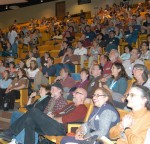The 2012 LTER ASM included a hilarious session involving “Lightning Round” plenary presentations, in which sites were allowed a maximum of two minutes to introduce their site science. The manner and form of presentation was entirely up to the sites to decide. Audience members were encouraged to shoo off the presenters as soon as their time was up—with no exceptions.The following poem by the Andrews Forest LTER’s Michael P. Nelson, who wowed the audience with his rhyme as much as his getup (a woolen hat in the form of a spotted owl), was voted the winner by audience members and took home the first ever ‘lightning round’ trophy. The presentation can be viewed at http://tinyurl.com/9uuno4d.
An ode to the Andrews Forest
We are the Andrews,
We speak for the trees,
The trees that are old, dripping with lichen and moss.
The trees that if you lost them, well, it would be quite a loss.
We sit smack dab in the Oregon Cascades,
Forest and stream ecoystems is what we try to explain.
And if you look at a map and turn it slightly askew,
our place looks like the new heart, the old Grinch grew.
Our place is known for it’s fast, cold running streams,
and a mountainous topography of elevational extremes.
For so long we’ve spoken for trees, for the streams, and for the river fish,
That some of our gang have even begun to look a bit Suess-ish.
Now over the years we have solved a few puzzles,
We scritched our heads hard, pay attention, then opened our muzzles:
Like how can old trees thrive when of nitrogen they are deprived.
How can they continue, why are they still alive?
Well it seems the tree canopies rain down a special elixer,
oregonium lobarium, ah, that’s a nitrogen fixer.
And important for forests are dead trees, too,
Promoting animal habitat diversity, nutrient cycling, and a place to perch and yell “WaHoo!”
And phenology, and hydrology, and the monitoring of streams.
And the impacts of logging, are just a few of our themes.
Our forest is full of animals of many a critter nation.
And plant succession, and carbon sequestration.
The way a forest reclaims it’s fallen ones, like a big turkey vulture
The slow decay of dead trees, you might call it morticulture.
And our efforts too have helped policy be plotted,
Stopping clear-cutting on national forests, and the protection of an owl that is spotted.
So we’ve spoken for trees in a number of ways,
and have spoken for them for more than 30 years, that’s nearly 11 thousand days.
And this is what else, the mores, and moreovers,
at the Andrews we welcome many explorers.
The humanities, even art, they all play a part.
For our problems are big ones, they demand gobs of brains.
My goodness we’ve even handed a philosopher the reigns.
By McOwiti O. Thomas (LNO)

 Enlarge this image
Enlarge this image
